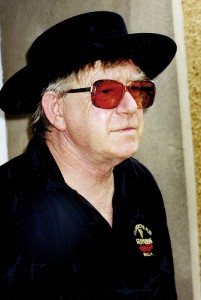 John Watt was one of the Scottish folk scene’s most charismatic characters, a songwriter of great talent and perception and a tireless champion of folk and traditional music for more than fifty years.
John Watt was one of the Scottish folk scene’s most charismatic characters, a songwriter of great talent and perception and a tireless champion of folk and traditional music for more than fifty years.
He was born into a musical family in Dunfermline on March 23, 1933. His paternal grandfather played violin, his Aunt Phyllis trained as a concert pianist and John’s father and Uncle Miller both played in the Dunfermline amateur orchestra.
Although John’s first ‘paid gig’ came at the age of six when his grandfather gave him sixpence for memorising the 23rd psalm, his musical quest really began during national service in the army from 1951-53 when he became interested in jazz after hearing Louis Armstrong, Kid Ory and Bunk Johnson.
Through jazz he discovered the blues – he cherished the experience of seeing Big Bill Broonzy at the Usher Hall, Edinburgh in 1953 – and skiffle music, and like other players in the folk revival, having heard American folk music, he set out to learn all he could about traditional music closer to home.
He visited the Howff in Edinburgh and befriended Gaelic singer Dolina McLennan and Archie Fisher, and when a cellar at the back of a chemist’s shop in Chalmers Street, Dunfermline became available, along with Jack Beck, John opened The Dunfermline Howff Folksong Club.
Their first night on October 16, 1961, featuring Dolina, Robin Gray, Archie and his sisters Ray and Cindy, was so successful that it had to be repeated the following night and was the beginning of a heady time that saw tradition bearers including Jimmy MacBeath and Jeannie Robertson, contemporary stars Josh MacRae and the Corrie Folk Trio and emerging talents including Bert Jansch, the Incredible String Band, Barbara Dickson and many other significant names all appearing.
By now John was established as a songwriter, his Pittenweem Joe having appeared in Norman Buchan’s 101 Scottish Folk Songs book, and as the 1960s moved towards the 1970s he became a prime mover in the Great Fife Road Show, a concert party that toured the kingdom’s folk music riches, including Jimmy Hutchison, Davey Stewart, Rab Noakes, and Barbara Dickson, across Scotland and down into East Anglia.
In 1976 John and Davey Stewart released their Shores of the Forth LP, which included John’s famous Kelty Clippie, and would be John’s only recording until Rab Noakes corralled John, a folio of typically characterful songs and a talented cast of musicians to produce Heroes in 2000.
John had been far from idle in the intervening years and continued working behind the scenes until his health began to deteriorate. He served as The Traditional Music and Song Association of Scotland’s chairman, presented numerous radio programmes and documentaries, gave lectures on Fife poets and songwriters and workshops on creative writing and musical appreciation, was chairman of the Love and Liberty Theatre Company and served on Milnathort Folk Festival’s committee.
When John died on October 31, 2011 he left behind memories of a singer, an immensely entertaining raconteur and a composer whose songs have been sung across Ireland, North America and Scandinavia and exercised a strong influence on the Scottish folksong revival. Above all, however, he was a warm, observant and humorous man who charmed everyone who met him.